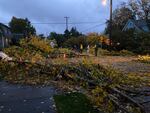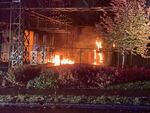Heavy rain and winds tore tree limbs and triggered power outages and flood warnings across Oregon on Friday night, marking an abrupt end to the Pacific Northwest’s recent warmer-than-usual weather.
Meanwhile, snow and ice in Eastern Oregon caused semi-trucks to spin out and block lanes on Interstate 84. So many trucks had to stop in Baker City that transportation officials started requiring westbound trucks from Idaho to stop at the border in Ontario instead.

A maple tree fell in Portland's Sellwood neighborhood during heavy winds and rain Friday night. It smashed a car and took down some power lines.
Stephani Gordon / OPB
The dramatic shift in weather was caused by a massive atmospheric river that swept in from the Pacific Ocean and pummeled the region.
As western Oregon highways became slick with rain, transportation officials had to close some roads due to car crashes, including two fatal incidents in which drivers lost control of their vehicles in Washington and Clatsop counties.
In Washington state, strong winds caused a floating home to break free and float untethered down the Columbia River.
Strong winds contributed to a floating home’s escape to Washington State Friday afternoon. No one was inside when the home broke free from a marina on the Columbia River in the 3300 block of NE Marine Drive. The owner is working w/ a contractor to re-secure the house. pic.twitter.com/ucTPGHKqir
— Multnomah Co. Sheriff’s Office (@MultCoSO) November 4, 2022
The heavy rains also flooded out Portland’s “Big Pipe” system Friday night, causing stormwater and sewage to overflow into the Willamette River. City officials are advising the public to avoid contact with the river for at least two days because of increased bacteria in the water.
As sewage flowed into the river, valley-floor winds as high as 40 miles-per-hour triggered power outages for several thousand Portland General Electric customers. A company spokesperson said most of those outages were due to wind-related equipment damage, but some were also caused by a fire at a substation in Portland’s Mount Tabor neighborhood. It’s unclear if the fire was caused by the storm; the spokesperson said PGE is still investigating the incident.
Portland responders fielded reports of fire and explosions near the substation at Northeast 60th Avenue and Stark Street around 9 p.m., according to a press release. Under advisement from a PGE representative after finding little threat to surrounding buildings and homes, Portland firefighters let the electrical fire burn itself out.
“This incident was complicated due in part that the substation was still energized along with all the oil from the transformer burning along the ground,” the release reads.
About 7,000 PGE electrical meters lost power due to the fire, but they’ve since been redirected to other power sources.

Portland Fire & Rescue crews responded to a fire at a Portland General Electric substation on Northeast 60th Avenue and Stark Street Friday night. No other buildings outside of the station were damaged.
Portland Fire & Rescue
Prepare now for a cold, wet winter
Friday night’s storm could be just the start of what’s expected to be a very cold and wet winter season. Emergency officials say now is a good time to stock up on things you’d need during a winter storm, whether you’re stuck at home or on the road.
“We encourage folks to have extra food, water, extra medication, important documents as part of their home preparedness,” said Andrew Phelps, director of the Oregon Department of Emergency Management. “When you’re out on the road, it’s important to have some of those same things: extra warm clothing, some extra nonperishable food, extra bottles of water, and other things that you may need to keep yourself safe.”
Phelps said the most important thing people can do is stay apprised of weather and hazard conditions. Some resources include:
- The National Weather Service, where people can find weather forecasts and alerts.
- TripCheck.org, where drivers can check road conditions in Oregon.
- OreAlert.gov, where Oregonians can sign up for local emergency alerts.
- In Washington, its state interactive road map.
The American Red Cross offers a comprehensive guide to understanding weather warnings and preparing for winter storms. Among the guidance, it advises people to protect their homes by:
- Creating an emergency plan with your family.
- Protecting pipes from freezing.
- Ensuring heat sources are installed correctly and safely.
Be extra cautious with heating equipment
Phelps said alternative heating sources, like wood- or coal-burning stoves, kerosene lamps and electric heaters powered by a generator can be helpful, but only if they’re used safely.
“There are some things that folks want to try to do that actually become more harmful than good, and generators are a great example,” Phelps said.
Generators can cause carbon monoxide poisoning or an electrical fire if they aren’t used correctly. The Red Cross also has a generator safety guide. Its advice includes:
- Keep the generator dry, and don’t touch it with wet hands, to avoid electrocution.
- Turn it off and let it cool before refueling, to prevent gasoline from spilling on hot engine parts and igniting.
- Store gasoline for the generator in a dry, cool, safe location away from the house.
- Never use a generator, grill, camp stove or other gas- or charcoal-powered equipment in a house, garage, basement or other partially enclosed area. Opening windows and doors doesn’t provide enough ventilation to prevent carbon monoxide poisoning.
Space heaters can also be a significant danger during the winter months. The National Fire Protection Association offers a space heater safety guide, which advises people to maintain a 3-foot clearance around them, and always turn them off and unplug them when they’re not in use.
Our #WinterOps managers know that, "The first snow of the season typically catches drivers unprepared and off-guard." Expected low-level snow is coming to the #SouthernOR Cascades and #SiskiyouSummit.
— OregonDOT (@OregonDOT) November 1, 2022
Here's what you need to know, BEFORE you head out: https://t.co/c1IVGh1mQp pic.twitter.com/qld7ZNrzeB
Traveling in the winter
While drivers can get timely updates on road conditions at Oregon’s TripCheck.org or Washington’s road map, Phelps said they should always keep safety gear in their cars.
“Weather can change really, really quickly, and you don’t want to find yourself without the proper equipment that you need to drive through snow,” Phelps said. “Like tire chains, for example, or having emergency kits in case you get stuck someplace.”
The Red Cross advises drivers to have their cars winterized before the winter storm seasons to avoid being stranded. It also advises drivers keep these items in their cars:
- A windshield scraper and small broom.
- A small sack of sand, for wheel traction, or a traction mat.
- Snow chains.
- Matches in a waterproof container.
- Red cloth to tie to the antennae.
- An emergency supply kit, including warm clothing.
